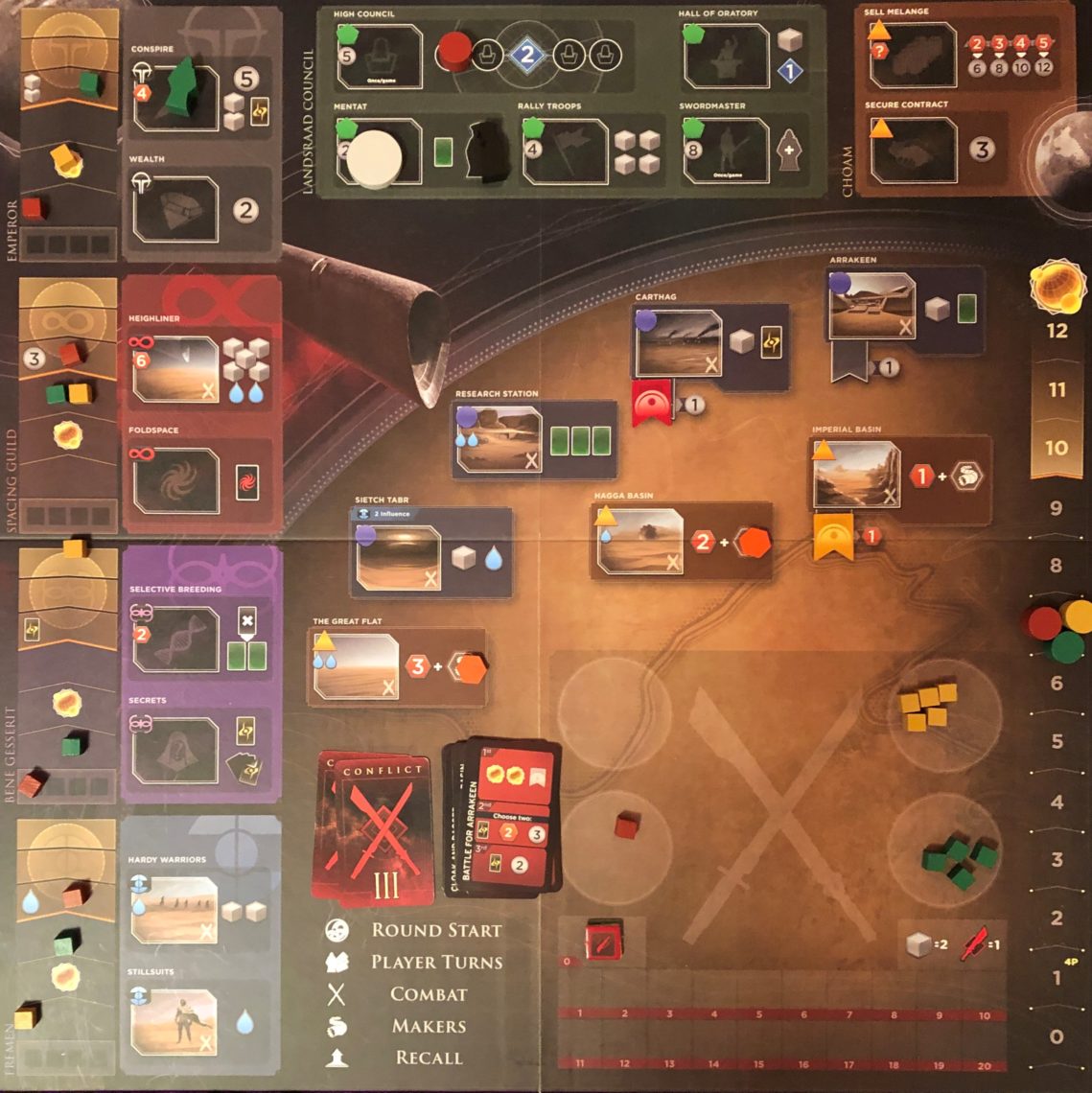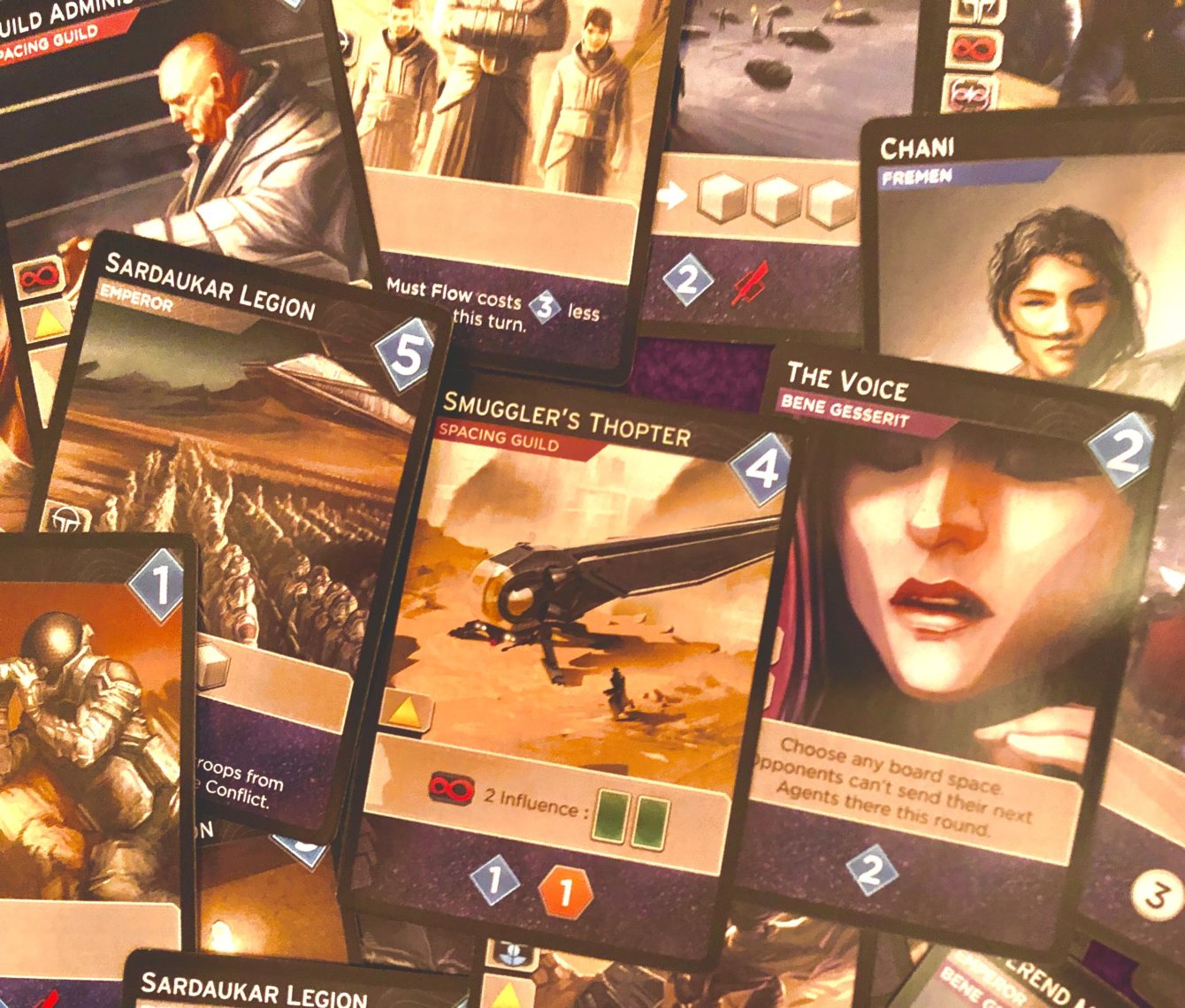Of course I was a science fiction nerd growing up. The “hard” kind: Asimov, Heinlein, Clarke, Haldeman, Blish…Never Herbert. Dune (the book) was too space-opera-ish and fantasy for my taste. I didn’t hate it or look down on it–I just wasn’t interested.
Same goes for the movie–I mean, lots of people avoided the movie. Never saw it, don’t plan to–even though it’s got Kyle MacLachlan and Sting in it. Mind you, I did find the Jodorowsky’s Dune documentary fascinating as a window into what might have been.
So when it came to Dune the tabletop game, it will probably not surprise you that I also gave it a pass; I played it for the first time maybe about ten years ago right after I finally got around to reading the book. I knew I had to try it, so beloved had it become. It did live up to the hype: it reminded me of Cosmic Encounter but with much less wacky randomness and a real sense of being in the action. Each of the six factions had unique special powers that mirrored their fictional counterparts: the Emperor got plenty of gold; the Fremen could fight like madmen; the Harkonnen got lots more Treachery cards, and so on. My favorite was the Bene Gesserit, who got to secretly pick a winner and a turn, and if they manage to make it happen they win instead!
Turns out that Dune and Cosmic Encounter had the same designers–I was today years old when I found that out, having just looked it up on BGG. However, like many games of its vintage, it draaaaaaagged quite a bit. In those days, people had longer attention spans and were willing (or expected, or forced) to put up with a fair bit of downtime between turns.
Naturally, I sucked at it. I suck at negotiation games in general, being a very bad liar and therefore incapable of the decisive stab in the back which is almost always necessary at some point. But I did enjoy trying to negotiate. The other problem was that it really needed a full complement of six to really shine, and that just wasn’t happening very often.
Still, I was intrigued enough to try Rex when it came out in 2012, since it promised streamlined gameplay and a shorter play time. And it delivered–but unfortunately since it was forced to jettison the Dune IP and invent a whole new backstory out of whole cloth about which I cared little, the game felt less juicy. After all, part of the fun of playing a (good) game based on a licensed IP is putting yourself in the role of characters you know and love.
But with copies of the original in rare supply, Rex was the only (Dune) game in town until Gale Force Nine acquired all the necessary rights and reissued a spiffed up version of the original which gave the game the wider audience that was hungering for it…
…and then Dire Wolf announced Dune: Imperium (D:I hereinafter). Four players max, and a solo option? Deck building and worker placement? You have my attention–and curiosity. The designer was Paul Dennen, of Clank! fame, so I had no doubt that the game’s mechanics would be solid. The questions in my mind were: (1) how much theme would be wedded to gameplay; and (2) would the game try to include the kind of negotiation and backstabbing that made the original Dune so beloved?

I can answer the first question pretty definitively, because the solo option has given me plenty of opportunity to explore the game’s play-space. Unfortunately, COVIDiocy has prevented me from trying D:I multiplayer (although it is available on Tabletopia Tabletop Simulator), so all I can do is offer some speculative thoughts there.
D:I offers excellent gameplay with plenty of interesting decisions and replayability. Players take the role of heads of various factions, each with unique passive and active powers but starting with unique starting decks. The game takes a maximum of ten rounds (less if a player reaches the winning VP threshold of 10 points). VP are earned by forming alliances with non-player factions, end-of-game scoring earned through certain Intrigue cards, but mainly by winning certain Conflicts. Conflicts happen at the end of each round and give juicy rewards–VP, faction loyalty, resources, and/or other stuff–to the player(s) with the highest combat invested; those rewards change from game to game via the randomness of the Conflict cards.
So unlike the original Dune multi-player victories aren’t possible, but it’s pretty hard to win without making at least one alliance with a non-player faction. Those alliances are earned by building loyalty, which in turn is generated by card-play.
The way that D:I welds deckbuilding and worker-placement together is very innovative. Each player starts the game with two Agents to place on one of the board’s action spaces. But where you get to place your Agent depends on the card you play to accompany it. If the card has one of the faction icons on it you can only place it on one of that faction’s action spaces–which also builds their loyalty to you. Build enough loyalty and you earn your alliance, which is worth both a VP and another reward.
The problem is, you only start the game with two cards with faction icons on them–and one of them is trashed when you play it. So your ability to earn loyalty is pretty weak unless you can buy a card from the Market that has a faction icon on it–and there aren’t many of them.
Other card icons permit you to send your agent to locations on Dune–either to gather spice, hire recruits and draw cards, or gain political clout up in the Landsraad Council. So unlike most other deckbuilders it’s not always a no-brainer when it comes to thinning your deck; you need to make sure you have access to all these areas as the game progresses. There’s nothing more frustrating than having the resources you need to take a powerful action and then realize you don’t have a card in hand which lets you play there.
Some cards give you extra stuff when you play them which is always helpful, and if you can thin out and tune your deck quickly enough you can set up a pretty wicked engine–but there aren’t a ton of ways to trash cards so it’s not easy. Plus some cards have awesome combat abilities which means you’re constantly dithering between playing them for actions or saving them for the end of the turn.
The game’s three resources: Solari (ie, money), water, and spice, are each required to take certain actions. Thus far, interestingly, I have found money to be the least useful after the early game (at least in solo mode). You definitely want to save up enough to buy your third Agent–but after that there’s not much else you can do with it most turns, unless you have a faction power or an Intrigue card that lets you trade it in for something else. I mean, if you’re awash in cash you can rent the services of a Mentat (an extra Agent) for a turn–but it uses up an action the Round you get it so you have to plan ahead, and in solo mode it costs 5 Solari unless you’re playing in easy mode.
Once you’ve placed your Agents you take a Rest turn which lets you use the rest of the cards in your hand for their Influence and Combat values (plus combat special abilities). There are cases where you’ll want to Rest before playing all your Agents but that’s pretty rare–although if there’s a card you really want to buy from the Market it might be worth sacrificing an Action to grab it before someone else can.
Conflicts in D:I retain a bit of the uncertain flavour of the original. You commit troops to the Conflict through Agent placement, so there’s some public knowledge. But instead of secretly bidding the number of troops you’re willing to commit you’ll use Intrigue cards and Combat abilities to beef up your numbers. In solo mode it’s not terribly exciting–although it definitely forces you to ensure you have a comfortable lead over your bot opponents–but I imagine in PvP mode it can be quite tense as players go round and round adding to their armies until someone blinks.
In general, Intrigue Cards are easy to overlook but you should definitely not ignore them. They provide much of the surprise and backstabby element in D:I.
The faction powers do tend to encourage slightly different playstyles but not nearly to the same extent as Dune Classic. You only have one card which activates your active power, and while all the passive powers are handy none of them are dominant from what I’ve been able to suss out so far. As with Clank!, it will come down more on how you tune your deck and take advantage of what comes up in the Market to build synergies. There are several paths to victory–you can even ignore Conflicts altogether and double down on an Influence- and Spice-driven strategy–but it’s risky, and very hard to catch up if you fall behind (at least in Solo Mode).

Speaking of which, Solo Mode–which is the only way I’ve played, remember–is challenging and unpredictable but possible to mitigate/prepare for to some extent. You play against two bots who draw from a common House Hagal deck which determines where they place their agents, what rewards they get when they place their Agents (instead of the standard ones). During Conflicts you flip one Hagal card per Bot to determine last-minute strength boosts. Bots get to play on factions a lot more than you normally do, so you’re forced into grabbing whatever cards come up in the market that enable you to keep up with them–otherwise they will run off with all the Alliance VP’s. There are some spaces they never play on so you don’t have to worry about them, but otoh there are some spaces they are likely to spam almost every round so you have to take advantage of turn order when possible to grab them (if you need them) before they do. The three difficulty levels are well-calibrated: I won Easy Mode walking away and consistently got hammered in Hard Mode (didn’t even try Expert Mode), so Standard Mode was just my size à la Goldilocks.
My only complaint about Solo Mode is there’s no way to wipe the Market if none of the cards tickle your fancy. A couple of people have posted house rules on BGG to correct for this; I like the one where a sand worm rises up and eats the oldest card in the Market every turn.
Component-wise the game is fine. Sleevers gonna sleeve, but the cards are sturdy enough on their own imho. The artwork is serviceable–obv they’re riffing off the upcoming movie, what with Timotheé Shamalamabingbong as Paul Atreides and all. Troops are cubes, spice is orange and hexagonal for some reason, and water is teardrop-shaped. All good. In terms of representation/diversity Dire Wolf was constrained by having to adhere to the movie casting, so it was out of their hands, kinda.
In conclusion, D:I is a very good game, and it’s a completely different experience than old/new Dune. If it’s a heavy bluffing/intimidation/negotiation game you want, and you’re willing to commit to a longer playing time, then Dune will better scratch that itch. But if you want a less interactive (but still far from multi-player solo) experience with excellent mechanics and a shorter playing time, then D:I is for you. And if like many of us you’re jonesing for good solo play options there’s no comparison–it’s D:I all the way.
You said it is available on Tabletopia, but did you mean Tabletop Simulator?
Good catch. I misremembered. It’s TTS, not Tabletopia. Thanks for pointing it out.